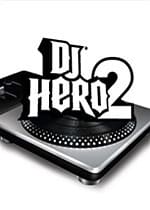When it comes to physical mechanics, there’s an inherent disconnect with just about every modern music-based game on the market. We take “playing” streamlined instruments with a grain of salt in games like Rock Band and Guitar Hero (and even karaoke-style games like Lips or Def Jam Rapstar), trading in the realism and complexity of playing a real musical instrument in exchange for the fun of being in a band or taking center stage.
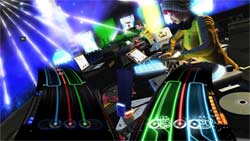
Since musical games try to recreate the same kind of symphonic experience musicians have when performing, this kind of sacrifice is perfectly acceptable. Who cares if assuming the role of a rock star with a plastic instrument is a completely different experience than actually playing a six-stringed guitar? With a game like DJ Hero, though, which deals with the complex and (to many of us) alien art of spinning, it’s not particularly surprising that what you do on a DJ Hero controller only somewhat resembles what an actual DJ does. While I don’t think it’s entirely fair to cast negative judgment on a game for not accurately emulating the craft it takes after—especially when that craft happens to be as potentially and overwhelmingly complex as audio mixing and engineering—the first DJ Hero did get some flack from some gamers and musicians for a somewhat “inauthentic” DJing experience.
With DJ Hero 2, FreeStyleGames has made some progress towards a purer freestyle mechanic, but the core tenets are the same. You might say that the title DJ Hero is actually a little misleading, since what you’re really getting is something of a casual DJ simulation, if most of the technical and freestyle elements of spinning were replaced with something a little more rhythm-game friendly. Like it or not, it’s a necessary concession to make: you can either have a Rock Band or Guitar Hero design that tackles some of the technique of actual DJing or you could have a hardcore spinning simulation that, much like Gran Turismo does in the racing world, could theoretically give any aspiring DJ or fan a powerful program that allows them to mix their favorite tracks together to create completely custom mixes (as well as all the creative expression that would come with it) rather than messing with elements of premade mash-ups, as the game actually does. The problem is that that would kill the pick-up-and-play arcade-style music design, severely limiting mainstream appeal. Not only would this make Bobby Kotick unhappy, it would also probably require a controller more complex than Steel Battalion’s. The Simon Says mechanics of DJ Hero may be an inelegant solution to a near-untapped musical genre in video games, but if you can get past the fact that you can’t spin what you want when you want and aren’t allowed to freestyle at will, there’s still some enjoyment to be had here.
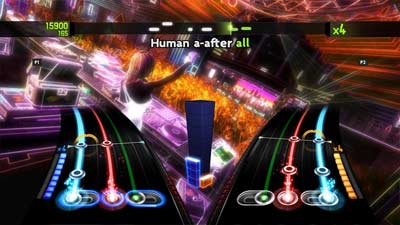
For the uninitiated, here’s a quick primer on how DJ Hero actually works: the DJ controller is split between a platter with three face buttons (left and right are the two tracks of the mash-up, middle is used for sampled sounds pulled automatically for appropriate tracks) and an audio mixing side that lets you control crossfading and effects, as well as activate Euphoria, DJ Hero’s power-up mode that increases your score while activated. Throughout the game’s Empire mode (basically arcade mode, mercifully with no story), you play clubs across the globe, spinning fairly long sets of mash-ups that usually last for between three to five songs. You know the drill—when the colored cues scroll to the bottom of the screen, hit the corresponding color on the controller. But DJ Hero has a few other elements that make it more complex in some ways than Rock Band or Guitar Hero. The three lines on the track highway can shift to the left or right when not in the center, which will temporarily cut out or between track channels when you slide the crossfader to one side or the other. Scratching is obviously a big part of DJ Hero as well, which can be as simple as scratching a note back and forth or having to perform directional scratches up or down on harder difficulties. Finally, you can screw around with audio levels using the effects knob in certain sections, which can produce some interesting sounds or provide contrast to part of a mash-up.
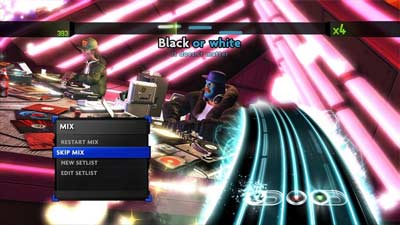
New to DJ Hero 2 are freestyle sections, which allow you to crossfade, scratch, and perform your own rhythms at will. It’s a shame that there isn’t a mode where you can just freestyle to your heart’s content, but these sections can be quite lengthy and will keep you on your toes.
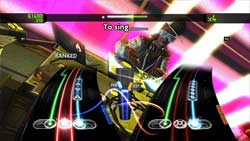
Naturally, being a rhythm game, the lower difficulties don’t offer too much challenge, while the tougher tracks on hard or expert will throw some pretty ridiculous (and often alternating or simultaneous) combinations of crossfading, effects, scratching, and basic rhythms at you. Unlike Guitar Hero, you can’t fail a set in DJ Hero—you just have to tough it out when you screw up, and the game won’t reward you stars to unlock new arenas, tracks, costumes, and other goodies if you’re not bringing you’re A-game.
Of course, a music game is only as good as its track selection, which, though somewhat a matter of taste, varies quite a bit and is for the most part quite good. Basically, if you’ve been in a packed club on a Friday or Saturday night any time in the last year or two (assuming the DJ is any good) chances are you’ve heard a lot of these tracks. FreeStyleGames have done a great job picking and mixing together some great mash-ups, a lot of which skew more towards modern dance pop and hip-hop. If you’re into it, the track selection is fantastic. Drake, Eminem, Lady Gaga, Kanye West, and B.o.B. (to name a few) are all featured here, though you’ll still find enough old-school hip-hop (Salt N Pepa and 2Pac, spring to mind) and requisites ranging from Jackson 5 to Daft Punk to keep most DJ fans happy.
If you were disappointed in the original DJ Hero’s lack of creative spinning freedom, there’s not much that’s going to change your mind with DJ Hero 2. But with the improvements to freestyling and a more “spin-off” competitive approach to multiplayer battles if you can get behind the Guitar Hero-style design of the game, DJ Hero will keep you busy—and entertained—for quite some time. And honestly, with a soundtrack as solid as this, it’s hard to complain too much.
RATING OUT OF 5 RATING DESCRIPTION 3.8 Graphics
The graphics are good enough, but nothing spectacular. Then again, you’re not looking at them when you play anyway, right? 4.0 Control
The DJ controller works well (though some of the buttons feel a little cheap). It can be a little tricky to balance the crossfade correctly and spinning the record backwards to replay a section of a song can sometimes be a little slippery. 4.8 Music / Sound FX / Voice Acting
With Lady Gaga, Kanye, Drake, and B.o.B. (among many others), there’s hardly a bad track on here. Expect to hear just about anything you would in a club. 3.7
Play Value
DJ Hero is a lot of fun, although some hardcore DJ and audio engineering types might complain that it offers little of the creative freedom of spinning. Multiplayer modes have been improved, however.
3.9 Overall Rating – Good
Not an average. See Rating legend above for a final score breakdown.
Game Features:
